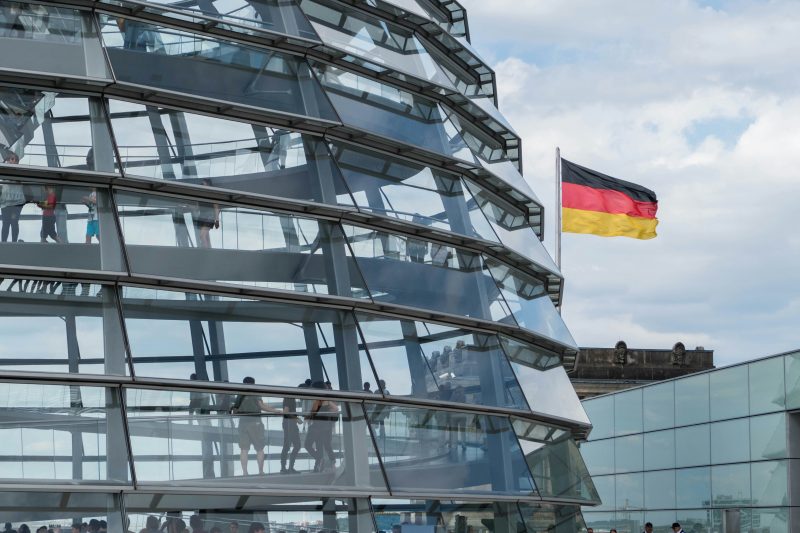Building movements on the doorstep: the case of Germany's Die Linke
The story of how Germany’s Die Linke was able to hold over 600,000 doorstep conversations in a few short weeks before a snap election.

This is the story of how Germany’s Die Linke became a political party that can knock on over 600,000 doors in a few short weeks before a snap election. It’s a story about what it takes to scale up one-on-one conversations (carried out by motivated and supported volunteers) – and about what we stand to gain when we do that.
While we wait on a study that is attempting to quantify the contribution of the doorstep conversation to the electoral result for Die Linke, there are a few things we can already say with confidence. Firstly, these conversations reached people who could not be reached any other way: people who feel unrepresented and alienated by the political system, people who do not use social media, and people who are more comfortable with verbal communication than communication via screens and text. And secondly, the process of carrying out those conversations transformed the volunteers who were doing the knocking too.
What sort of conversations took place?
The volunteers were trained in approaches that more closely resemble deep canvassing techniques than traditional pre-election canvassing. They asked: “if you were Chancellor, what would you change?”. That’s an important invitation to the person to think and reflect, and an offer to be heard. They were also asked “what are the most important issues for you?”
Volunteers were trained to follow the 70% listening / 30% talking rule and when they did talk, above all to ask questions and listen. Unsurprisingly given the relentless drum beat of the media on the issue, immigration would often be named as the “most pressing issue”. However, with the right follow up questions, it was very often revealed that other social issues were having a more tangible and practical impact of the lives of these questioned. These were issues that would be effectively addressed by public investment – and would not be solved at all by “remigration” (the far-right fever dream of deporting everyone who isn’t white German, according to their definition).
For example, a volunteer in Leipzig spoke to an elderly lady who initially blamed migrant neighbors for rubbish piling up around the communal rubbish bins. However it turned out that the elderly woman’s husband had an advanced illness and she was his round-the-clock carer, unable to afford all the medication he needs. Solutions to these issues could be local regulation, for example, requiring the landlord putting in place more frequent rubbish removal, or public investment, in social workers, in home help, and in programs that address the structurally low pensions for citizens of the former East Germany.
“ Volunteers have taken their experiences door knocking for Die Linke back to their groups, and are now confident advocates for tactics that reach outside their immediate political bubble.”
Anyone who has done any mentoring or coaching knows that it can be much more powerful to ask a question that prompts reflection than to tell someone what to think or what to do. One volunteer who had no previous door step conversation experience, described the experience as the most engaging and instructive of their politically engaged life. She observed, “if the fascists can win votes, they can also lose them”.
What was new?
Die Linke managed to attract thousands of volunteers for this work, often from non-party members or new party members – no mean feat given the traditional skepticism with which German parties regard these kind of organising approaches. But the sheer scale of the Die Linke election volunteering indicates that finally the tactic is regarded by the majority as credible after years and years of slow difficult work to change the culture of both institutions and social movements.
The outlook in this regard looks pretty rosy both in and outside the party. While Die Linke is scrambling to engage their tens of thousands of new members in local organising work that seeks to address cost of living issues such as a nation-wide rent cap, volunteers from social movements have taken their experiences door knocking for Die Linke back to their groups and are now confident advocates for tactics that reach outside the bubble familiar with the necessary organisation and training. But perhaps most important of all they take with them all the conversations they had and all those insights into perspectives and lives outside of their own mileu.
Movement Hub
For the last three and a half years Movement Hub has been supporting various initiatives that have applied” structure based organising” in non-workplace settings. We have prioritised this work because we recognised that the climate movement was in the process of being “wedged”. Painted as into a corner as a movement that makes ordinary people’s lives more expensive and difficult. We recognised that we needed to find those points where decarbonisation and cost of living intersect, and then we needed to organise people who were not (climate) activists and were never going to be first and foremost climate activists.
We noticed that when we looked for those points of intersection, we often revealed the need to transform ownership and management structures to more democratic and collective forms. Starting with these observations we prioritised: a) work that developed ways to engage everyone in a structure (not just the people who already agree with us) on terms that makes sense to them b) approaches that focused on winning a specific improvement from an opponent through the collective public protest led by the people in the structure and c) work that builds longer term capacity for democratic participation.
As such we supported with strategic accompaniment, or fiscal hosting and other incubation services all of the key organising projects that made the Die Linke knocking possible. Because that work did not come from the party itself – it came from, was undertaken by and was not possible without the participants of social movements (most specifically climate, housing, migrant and anti-fascist movements).
What we recognise now is that we need to formalise the support structures that enable this scaling up, so these tactics can be used to support the green transition in various forms by a range of actors who have never used them before.
We all need to consider whether it is time to take up “organising
outside the bubble” as an additional strand of work. That doesn’t mean
that the work we do to maintain our existing progressive base and
subcultures, grow our activist campaigns and memberships of like-minded
people inside the bubble doesn’t matter. It’s a recognition that
business-as-usual work is not adequate for the challenges at hand.
- Carol Peterson, Movement Hub


